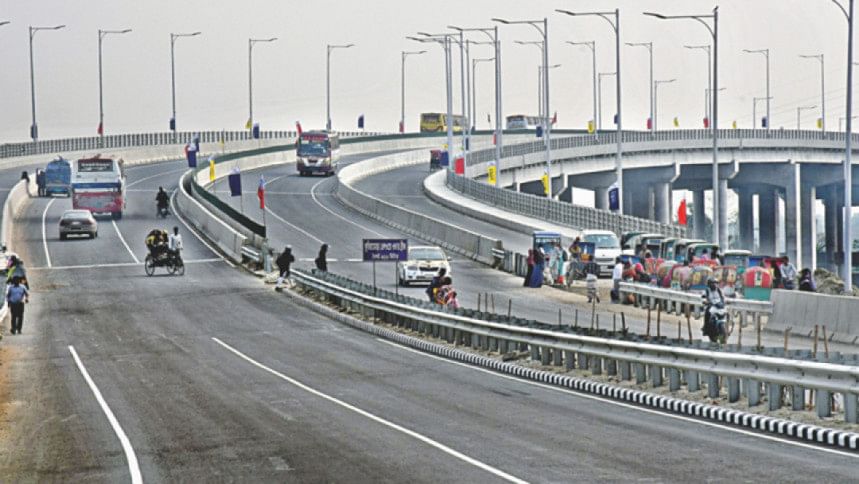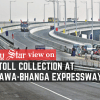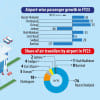Dhaka-Mawa-Bhanga tollway: Modern road, manual operation

As the Dhaka-Mawa-Bhanga expressway was opened to traffic in March 2020, the Roads and Highways Department had over two years to introduce an automated toll collection system for motorists.
But only last week, the department appointed a joint venture firm led by Korea Expressway Corporation (KEC) and started toll collection manually from Friday. The development caused long tailbacks on the highway.
The toll collection has started even as four entries and exits do not have toll booths yet. The RHD is now collecting tolls near Dhaleshwari Bridge in Munshiganj for the Dhaka-Padma Bridge section of the highway and in Bhanga of Faridpur for Padma Bridge-Bhanga section of the highway.
As a result, a motorist has to pay for a whole section, even if they do not use the whole section. Conversely, the RHD is being deprived of revenue from vehicles that leave the highway before going through a toll plaza.
Besides, RHD started toll collection without consulting the associations of transport owners and workers. This resulted in drivers engaging in arguments with the employees at the toll plazas and causing delays for the other road users.
Traffic flow was quite normal on the expressway yesterday, but road users fear that there will be congestion during the Eid rush.
In that case, people going to their hometowns in the southwestern region during the vacation would face setbacks. The Padma Bridge has reduced travel time to some districts by two-three hours and ended the uncertainties associated with ferry services.
The Bangladesh Bridge Authority (BBA) also could not introduce an automated toll collection system for using the Padma Bridge and it would take six more months to launch the system.
"This has exposed their lack of planning," noted transport expert Prof Shamsul Hoque said, adding that an expressway without an automated toll collection system was rare in the world.
"The Padma Bridge and the expressway are modern structures. If we cannot introduce a modern operating system, the people will not get the expected benefits," he told The Daily Star yesterday.
MANUAL OPERATION
In September 2019, Prime Minister Sheikh Hasina at an Ecnec meeting instructed the authorities concerned to collect toll from long-haul vehicles on the national highways.
The PM in March 2020 opened the country's first expressway titled "Jatir Pita Bangabandhu Sheikh Mujibur Rahman Highway". The 55km road was built at a cost of Tk 11,003 crore, making it the most expensive road (considering the expenditure in terms of length) in the country.
The finance ministry, following a proposal made by the Road Transport and Highways Division in April 2021, approved a toll rate of Tk 10 per km for the time being as the authorities wanted to start toll collection from July that year.
But the authorities stepped back from their decision as structures needed for toll collection were not ready.
The Cabinet Committee on Economic Affairs in August last year approved a proposal to appoint Korea Expressway Corporation to collect toll on the expressway.
Although a KEC-led firm was selected through a direct procurement method, the RHD signed a five-year contract with it on June 29 this year.
As per the contract, the firm will collect tolls manually for the first six months. As it began operation on Friday, tailbacks reached up to five km near Dhaleshwari Bridge toll plaza and Bhanga.
WHAT ARE THE PROBLEMS?
Currently, the toll plazas near the Dhaleshwari Bridge and in Bhanga have 12 booths each -- six for either direction.
There will be toll plazas at the entries and exits in Abdullahpur, Sreenagar, Puliabazar and Maligram.
There are booths at those points, but those are not ready for toll collection yet, an RHD official said.
Contacted, Najmol Haque, superintendent engineer (Narayanganj circle) of RHD, said there would be three systems for toll collection: Two booths will have an Electronic Toll Collection (ETC) system, two others will have a touch-and-go system, and the rest two will be operated manually.
An ETC system identifies vehicles through radio frequency and the system automatically takes the toll money from the user's bank account. It does not require vehicles to stop for paying tolls.
In a touch and go system, motorists buy a card that has to be swiped on a machine at the toll plaza. The process doesn't take more than a few seconds.
The contractor will have to get the systems running in six months, Najmol said.
On Wednesday, when RHD signed the contract with the Korean joint venture, this correspondent asked RHD Chief Engineer AKM Manir Hossain Pathan why the signing happened so late and why toll was being collected manually. But he did not give a direct answer.
"We did not sit idle. We have called for tenders following the procedure and we took measures to appoint a service provider," he said. "There could have been better preparation for a full-fledged system... but our efforts should not be questioned."
Khondaker Enayet Ullah, secretary general of Bangladesh Road Transport Owners Association, said unless there are more toll booths, traffic will see major bottlenecks during Eid rush.
He said there should be more publicity regarding the toll, so that road users get aware of it beforehand.

 For all latest news, follow The Daily Star's Google News channel.
For all latest news, follow The Daily Star's Google News channel. 









Comments